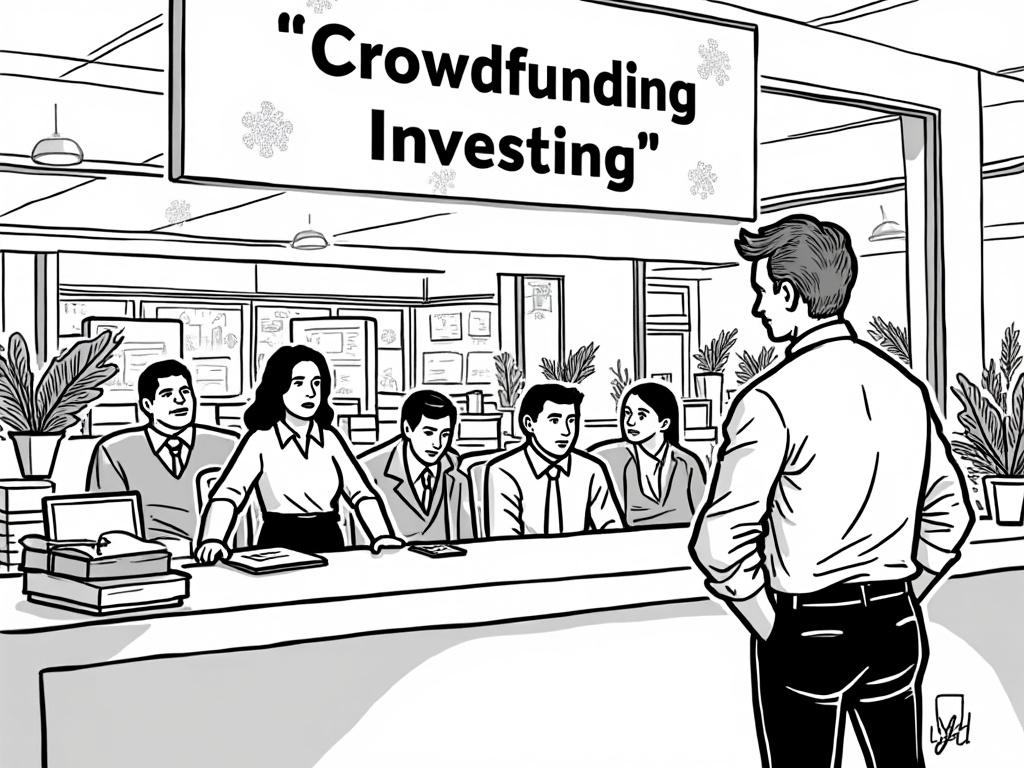
Real Estate Crowdfunding Platforms in Greece: How to Invest in 2025
Reading time: 12 minutes
Table of Contents
- Understanding Real Estate Crowdfunding in Greece
- Key Platforms Operating in Greece
- Investment Strategies for 2025
- Legal Framework and Regulations
- Risk Assessment and Expected Returns
- Practical Steps to Start Investing
- Your Investment Journey: What Lies Ahead
- Frequently Asked Questions
Understanding Real Estate Crowdfunding in Greece
Ever wondered how you could invest in premium Greek real estate without the hefty down payments and property management headaches? Welcome to the world of real estate crowdfunding—where traditional barriers crumble and opportunities multiply.
Real estate crowdfunding in Greece has evolved dramatically since 2020, transforming from a niche investment vehicle into a legitimate pathway for both domestic and international investors. Unlike traditional property for sale in greece, crowdfunding allows you to own fractional shares in high-value properties with investments starting as low as €100.
Key Market Insights:
- Greek real estate crowdfunding grew by 340% between 2022-2024
- Average investment returns range from 6-12% annually
- Over 15,000 investors participated in Greek projects in 2024
- Tourism recovery boosted short-term rental investments by 280%
Here’s the straight talk: The Greek market offers unique advantages that savvy investors are capitalizing on. The country’s tourism rebound post-COVID, combined with EU recovery funds and growing digital nomad interest, has created a perfect storm of opportunity.
The Greek Advantage: Why Now?
Consider Maria, a German software engineer who invested €2,000 across three Athens apartment projects in early 2024. By December, her portfolio generated €240 in returns—a 12% yield that outperformed most European bonds. Her success wasn’t luck; it was strategic timing in a recovering market.
The Greek real estate market benefits from several converging factors:
- Golden Visa Program: Attracts international buyers, boosting demand
- Digital Infrastructure: Remote work trends increase rental demand
- Tourism Recovery: Short-term rental yields reaching pre-2019 levels
- EU Funding: €32 billion recovery package improving infrastructure
How Crowdfunding Works in Practice
Imagine you spot a luxury villa renovation project in Mykonos requiring €500,000. Traditional investment would mean purchasing the entire property. Through crowdfunding, 250 investors contribute €2,000 each, sharing both ownership and returns proportionally.
The process typically involves:
- Project Selection: Platforms vet properties and present investment opportunities
- Due Diligence: Investors review financial projections, location analysis, and developer credentials
- Investment: Funds are pooled and deployed for property acquisition or development
- Management: Professional teams handle operations, maintenance, and tenant relations
- Returns: Profits distribute quarterly or annually based on rental income and appreciation
Key Platforms Operating in Greece
The Greek crowdfunding landscape features both local specialists and international players adapting to local market conditions. Each platform offers distinct advantages depending on your investment goals and experience level.
Platform Comparison Analysis
Investment Platform Performance Metrics (2024)
| Platform | Min Investment | Focus Area | Track Record | Key Strength |
|---|---|---|---|---|
| EstateGuru | €50 | Development loans | 0% default rate | Secured lending |
| CrowdEstate | €500 | Luxury tourism | 24 projects completed | High-end properties |
| Reinvest24 | €100 | Rental properties | €850M+ funded | Passive income focus |
| Greek Crowdfund | €250 | Local developments | 3 years operating | Local expertise |
| Fundrise Europe | €1,000 | Mixed portfolios | US expansion | Diversification |
Platform Selection Strategy
For Beginners: EstateGuru offers the lowest entry barrier with €50 minimum investments and strong security through first-lien mortgages. Their user interface simplifies complex financial data into digestible insights.
For Experienced Investors: CrowdEstate targets luxury tourism properties with higher returns but requires deeper market understanding. Their projects often involve Santorini villas and Mykonos developments with 10-15% projected returns.
For Passive Income Seekers: Reinvest24 specializes in buy-to-rent properties, providing quarterly distributions from rental income. Their Greek portfolio includes Athens apartments and suburban family homes.
Investment Strategies for 2025
Smart investors don’t just throw money at attractive projects—they develop systematic approaches aligned with Greece’s evolving market dynamics. Let’s explore proven strategies that seasoned crowdfunding investors use to maximize returns while managing risk.
The Tourism Recovery Play
Greece’s tourism industry generated €20.6 billion in 2024, surpassing pre-pandemic levels. This recovery creates opportunities in short-term rental properties, particularly in secondary destinations gaining popularity.
Strategic Focus Areas:
- Emerging Islands: Paros, Naxos, and Milos offering 15-20% lower entry costs than Mykonos
- Mainland Coastal Towns: Nafplio, Chania, and Volos benefiting from domestic tourism growth
- Athens Neighborhoods: Exarchia, Psyrri, and Koukaki experiencing gentrification
Take the case of Andreas, a crowdfunding investor who allocated 60% of his €10,000 budget to tourism-related projects. His Paros villa renovation returned 14% in its first year, while traditional Athens apartments yielded 8%. The key? Recognizing that tourists increasingly seek authentic experiences beyond mainstream destinations.
The Digital Nomad Strategy
Greece’s new digital nomad visa program, launched in 2021, attracts remote workers seeking Mediterranean lifestyle with reasonable living costs. This demographic shift creates sustained rental demand in specific property types.
Target Property Characteristics:
- High-speed internet infrastructure
- Flexible lease terms (3-12 months)
- Co-working space proximity
- Modern amenities and furnishing
Platforms like CrowdEstate now offer “nomad-ready” property classifications, indicating renovations specifically designed for remote workers. These properties command 20-30% rental premiums compared to traditional long-term rentals.
Diversification Framework
Professional crowdfunding investors follow allocation strategies similar to traditional portfolio management. Here’s a proven framework adapted for Greek real estate crowdfunding:
Conservative Portfolio (40% allocation):
- Established rental properties in Athens center
- Secured development loans with collateral
- Projects with 3+ year operating history
Growth Portfolio (40% allocation):
- Tourism development projects in emerging areas
- Mixed-use developments combining retail and residential
- Renovation projects in gentrifying neighborhoods
Speculative Portfolio (20% allocation):
- Pre-construction luxury developments
- Experimental property types (co-living, co-working)
- New platform launches with competitive terms
Legal Framework and Regulations
Navigating Greek crowdfunding regulations might seem daunting, but understanding the framework protects your investments and ensures compliance. The regulatory landscape evolved significantly in 2023 with new EU-aligned guidelines.
Key Regulatory Bodies
The Hellenic Capital Market Commission (HCMC) oversees crowdfunding platforms operating in Greece. Since 2023, platforms must obtain specific licenses and maintain investor protection standards. This regulation actually benefits investors by eliminating fly-by-night operators.
Essential Compliance Requirements:
- Platform licensing and annual audits
- Investor education and risk disclosure
- Segregated client fund accounts
- Maximum investment limits for retail investors
Tax Implications for International Investors
Tax treatment varies significantly based on your residence and investment structure. Here’s what matters most:
For EU Residents: Greece applies a 15% withholding tax on rental income, potentially reduced through double taxation treaties. Capital gains face a 15% tax rate for properties held over five years.
For Non-EU Residents: Standard withholding rates apply, but many countries have favorable treaties with Greece. Always consult tax professionals familiar with cross-border real estate investments.
Pro Tip: Some platforms handle tax obligations automatically, deducting applicable rates before distributing returns. This simplifies compliance but may not optimize your overall tax position.
Investor Protection Mechanisms
Licensed platforms must provide specific protections that didn’t exist in early crowdfunding days:
- Fund Segregation: Client investments held separately from platform operating funds
- Insurance Coverage: Professional indemnity and cyber liability protection
- Dispute Resolution: Alternative dispute resolution procedures
- Transparency Requirements: Regular project updates and financial reporting
Risk Assessment and Expected Returns
Let’s address the elephant in the room: crowdfunding isn’t risk-free, and anyone promising guaranteed returns is misleading you. However, understanding risks allows you to make informed decisions and structure investments appropriately.
Primary Risk Categories
Project-Specific Risks:
- Construction Delays: Development projects may face permitting issues or contractor problems
- Market Fluctuations: Tourism demand volatility affects short-term rental returns
- Tenant Risks: Vacancy periods or problematic tenants impact cash flow
- Currency Risk: For non-Euro investors, exchange rate fluctuations affect returns
Platform Risks:
- Platform Failure: Though regulated, platforms can still face operational challenges
- Liquidity Constraints: Most investments lock funds for 2-5 years
- Fee Structures: Management fees can erode returns over time
Realistic Return Expectations
Based on 2024 performance data across major platforms, here are realistic return ranges:
Conservative Investments: 5-8% annually from established rental properties and secured loans. These typically offer quarterly distributions and lower volatility.
Growth Investments: 8-12% annually from development projects and emerging tourism areas. Returns often concentrate at project completion rather than regular distributions.
Speculative Investments: 12-20% potential returns, but with significantly higher risk of partial or total loss. Only suitable for experienced investors with strong risk tolerance.
Risk Mitigation Strategies
Elena, a successful crowdfunding investor with €50,000 deployed across Greek projects, shares her risk management approach:
“I never invest more than 5% of my portfolio in a single project. I spread investments across different platforms, property types, and geographic regions within Greece. Most importantly, I only invest money I can afford to lose.”
Her practical guidelines:
- Platform Diversification: Use 3-4 different platforms to reduce concentration risk
- Geographic Spread: Balance Athens properties with island and mainland investments
- Project Stage Mix: Combine operational properties with development projects
- Regular Review: Monthly performance monitoring and quarterly strategy adjustment
Practical Steps to Start Investing
Ready to transform complexity into opportunity? Here’s your actionable roadmap for entering Greek real estate crowdfunding in 2025.
Phase 1: Foundation Building (Weeks 1-2)
Step 1: Financial Assessment
Determine your crowdfunding allocation within broader investment strategy. Financial advisors recommend limiting alternative investments (including crowdfunding) to 10-15% of total portfolio.
Step 2: Platform Research
Create accounts on 2-3 platforms but don’t fund them yet. Spend time understanding each platform’s project types, fee structures, and user interfaces. Most platforms offer demo modes or educational content.
Step 3: Market Education
Follow Greek real estate news through sources like Property Turkey, Greek Reporter, and local platform blogs. Understanding market cycles prevents poor timing decisions.
Phase 2: Strategic Deployment (Weeks 3-4)
Step 4: Start Small
Make your first investment with €100-500 in a conservative project. This provides real-world experience without significant risk exposure. Choose established rental properties over development projects for your first investment.
Step 5: Document Everything
Create a simple tracking spreadsheet including investment dates, amounts, expected returns, and actual performance. This data becomes invaluable for refining strategy.
Step 6: Gradual Scaling
Increase investments gradually as you gain experience and confidence. Many successful investors spend 6-12 months learning before making substantial commitments.
Phase 3: Optimization (Months 2-6)
Advanced Strategies:
- Auto-Investing: Some platforms offer automated investment based on your criteria
- Secondary Markets: Buy existing investments from other investors seeking liquidity
- Platform Incentives: Take advantage of new user bonuses and loyalty programs
- Community Engagement: Join platform forums and investor groups for insights
Common Pitfalls to Avoid
Learn from others’ mistakes instead of making your own:
The “Hot Project” Trap: Don’t chase last week’s success story. Projects filling quickly might indicate hype rather than quality.
Platform Loyalty: Sticking to one platform limits opportunities and increases concentration risk.
Ignoring Fees: Small percentage fees compound over time. A project promising 10% returns with 2% annual fees only nets 8%.
Emotional Investing: Falling in love with beautiful property photos clouds judgment. Focus on financial metrics and market fundamentals.
Your Investment Journey: What Lies Ahead
The Greek real estate crowdfunding landscape in 2025 stands at an inflection point. Market maturation, regulatory clarity, and economic recovery create conditions similar to early-stage opportunities that generated exceptional returns for pioneering investors.
Your Strategic Action Plan
Immediate Actions (Next 30 Days):
- Platform Selection: Register with EstateGuru and one local Greek platform to compare opportunities
- Initial Investment: Deploy €200-500 in a conservative rental property project to gain practical experience
- Knowledge Building: Subscribe to platform newsletters and Greek real estate market reports
- Network Development: Join online investor communities focused on European crowdfunding
- Documentation Setup: Create investment tracking systems for tax and performance monitoring
Medium-Term Goals (3-6 Months):
- Build a diversified portfolio across 5-8 projects
- Develop expertise in specific Greek regions or property types
- Establish relationships with platform account managers
- Refine investment criteria based on actual performance data
Long-Term Vision (12+ Months):
- Scale to your target allocation while maintaining diversification
- Explore advanced strategies like secondary market trading
- Consider direct property investments using crowdfunding experience
- Mentor other investors entering the space
Future Market Predictions
Industry experts anticipate several trends shaping the next 2-3 years:
Technology Integration: AI-powered project selection and blockchain-based ownership tracking will enhance transparency and efficiency.
Institutional Participation: Pension funds and family offices entering crowdfunding markets will increase available capital and project quality.
Product Evolution: Expect new investment structures like real estate tokens and fractional NFT ownership gaining regulatory approval.
The question isn’t whether Greek real estate crowdfunding will grow—it’s whether you’ll position yourself to benefit from this growth. Start your journey today with small, calculated steps, and let market experience guide your evolution from novice to sophisticated investor.
Remember: The best investment strategies aren’t perfect from day one. They evolve through continuous learning, careful observation, and gradual refinement. Your first investment teaches more than months of theoretical research ever could.
Are you ready to transform passive savings into active real estate investments that work while you sleep?
Frequently Asked Questions
What minimum amount do I need to start investing in Greek real estate crowdfunding?
Most platforms allow investments starting from €50-100, making Greek real estate accessible to almost any budget. However, for meaningful diversification and to cover platform fees effectively, consider starting with €1,000-2,000 spread across multiple projects. This allows you to test different platforms and property types while learning the market dynamics without significant financial risk.
How liquid are crowdfunding real estate investments compared to direct property ownership?
Crowdfunding investments typically lock your funds for 2-5 years depending on project type, making them less liquid than stocks but more flexible than direct property ownership. Some platforms offer secondary markets where you can sell your stake to other investors, though usually at a discount. Unlike direct property ownership, you avoid lengthy sales processes, legal fees, and market timing issues when exiting positions.
Are there any restrictions for non-EU citizens investing in Greek real estate crowdfunding?
Non-EU citizens can participate in most Greek real estate crowdfunding platforms, though some platforms may have country-specific restrictions based on their licensing. The main considerations involve tax obligations in your home country and potential currency exchange risks. Always verify platform accessibility from your jurisdiction and consult tax professionals regarding international investment reporting requirements before committing funds.

Article reviewed by Maximilian Vogel, Mittelstand Real Estate | Family-Owned Business Succession Planning, on June 6, 2025
